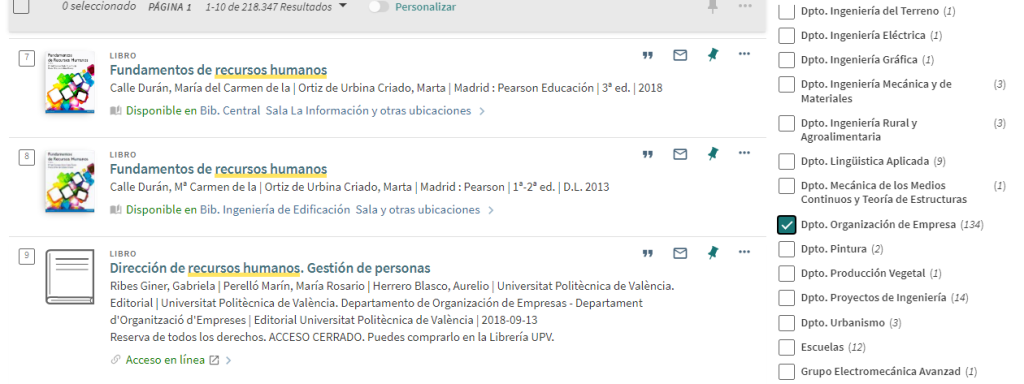Actualizo en Junio de 2024 la información previa (complementa lo publicado anteriormente en: Trabajos final de master y grado (TFM-TFG) | Blog de Juan A. Marin-Garcia (upv.es) y TFG/TFM cómo citar (en trabajos final de grado o máster) | Blog de Juan A. Marin-Garcia (upv.es))
Cosas que deberías revisar si estás cumpliendo:
En el documento escrito a presentar:
- ¿Has revisado esta rúbrica? https://jamg.blogs.upv.es/files/2021/08/RUBRICA_TFG_GIOI_v07.pdf y redactado el documento para que se pueda poner la nota más alta de cada apartado (especialmente de las páginas 3, 5 y 6. La página 9 es para exposición oral)
- Incluye citas en el texto (que luego aparecerán detalladas en la lista de referencias). Por ejemplo, la información de la empresa la habrás sacado de su pagina web, ¿verdad? Pues lo citas. Y cuando usas PACE, SOP, o las fórmulas de OEE, etc., puedes citar libros o documentación (sea PDF en riunet o videos de riunet o media.upv) de las asignaturas donde te han explicado cómo usarla.
- Si vas a usar los “apuntes” de poliformat de una asignatura, en las referencias no pones la ruta a Poliformat. Eso no es un libro son materiales de la asignatura no publicados. Y deberías poner algo parecido a esto: García Sabater (2023), Equipos de alto rendimiento para la mejora continua. Documentación de la asignatura. No publicado.
- Pero para los temas específicos es muy probable que tengas materiales en media UPV o riunet. Por lo tanto sería mejor estas citas específicas del tipo (ajústalo a las herramientas/metodologías usadas en tu TFG):
- García Sabater, JJ.; Valero Herrero, M.; Marín García, JA. (2011). VSM. Mapa de la cadena de valor. Plantillas de obtención de datos. http://hdl.handle.net/10251/12946
- García Sabater, JJ.; Maheut, J. (2015). Flujo de materiales en el mapa de la cadena de valor (VSM). Universitat Politècnica de València. http://hdl.handle.net/10251/53044
- García Sabater, JJ.; Vidal Carreras, PI. (2011). Metodología 5S: Materiales para la implantación. http://hdl.handle.net/10251/12949
- Pero para los temas específicos es muy probable que tengas materiales en media UPV o riunet. Por lo tanto sería mejor estas citas específicas del tipo (ajústalo a las herramientas/metodologías usadas en tu TFG):
- Si tu estilo de citación en el texto no es numerada, sino que es (Autor/a, Año). No pongas números en la lista de referencias del final, sino que pones las referencias ordenadas alfabéticamente por apellidos del primera autor/a.
- En los accesos a página web incluye la fecha de acceso (lo tenía en la recomendación de cómo citar, pero lo recuerdo una vez más)
- En el presupuesto incluye un “cronograma” de las horas dedicadas (por horas cada mes o por horas en cada Hito) y luego sumas las horas para el presupuesto. Esto te puede servir para mostrarlo como plan de acción. Un listado de las tareas identificadas en los apartados anteriores. Si quieres conectarlo con el presupuesto: tareas; fechas en modo Gantt; persona responsable; personas que intervienen u otros recursos; y coste de cada una de esa tarea
- Añade un plan de riesgos. ¿qué plan B tienes si alguna de las tareas no se puede completar o se retrasa?
- Las imágenes y tablas SIEMPRE se citan en el texto (si añades una imagen o tabla es porque vas a explicarla o usar algo en el texto. En esa parte del texto debes hacer referencia a la tabla o imagen que corresponda).
- Por ejemplo algo tipo “entre las operaciones de Suministro de Material y Mecanizado, los operarios/as van seleccionando diferentes OF para recoger la materia prima necesaria sin ningún tipo de orden o gestión, lo que genera grandes cantidades de OF acumuladas (ver imagen 23 y 24) que finalmente quedan con excesivos tiempos de espera antes de ser mecanizadas. En la Tabla 4 se presenta el promedio de tiempo de espera de las OF en cada una de las semanas del año. Se considera excesivo cuando es superior a 300 horas y todas las OF lo han superado”
- Explica la metodología que vas a usar para realizar el TFG. Una cosa son las herramientas y otra la metodología que vas a usar. Tienes que comentar y referenciar ambas, no solo las herramientas. Por ejemplo, el “triple diamante” es una metodología (Marin-Garcia, J. A., Garcia-Sabater, J. J., Garcia-Sabater, J. P., & Maheut, J. (2020). Protocol: Triple Diamond method for problem solving and design thinking. Rubric validation. WPOM-Working Papers on Operations Management, 11(2), 49-68. https://doi.org/10.4995/wpom.v11i2.14776. DMAIC es otra metodología. Hay otras metodologías de proyectos.
- Incluye unos objetivos generales y específicos del TFG/TFM
Al depositarlo en la plataforma de la UPV:
Para el deposito del TFG ten en cuenta que hay 3 niveles de “confidencialidad” en la UPV. Los dos primeros aparecen en la parte superior de la ventana (Como opciones excluyentes). El tercero aparece como una casilla de verificación más abajo en la pantalla:
- Publico: tu TFG es visible (el resumen y el PDF) desde riunet
- Privado: solo es visible el titulo y el resumen. El DPF no es accesible. Te tienen que pedir autorización expresa a ti para poder verlo (supongo que es el nivel que te interesa)
- Restricción de publicidad: este es el 100% confidencial y exige justificarlo con un convenio de confidencialidad con la empresa y hacer defensa a puerta cerrada…
En la presentación/defensa del trabajo:
- Numerar diapositivas
Visitas: 13








